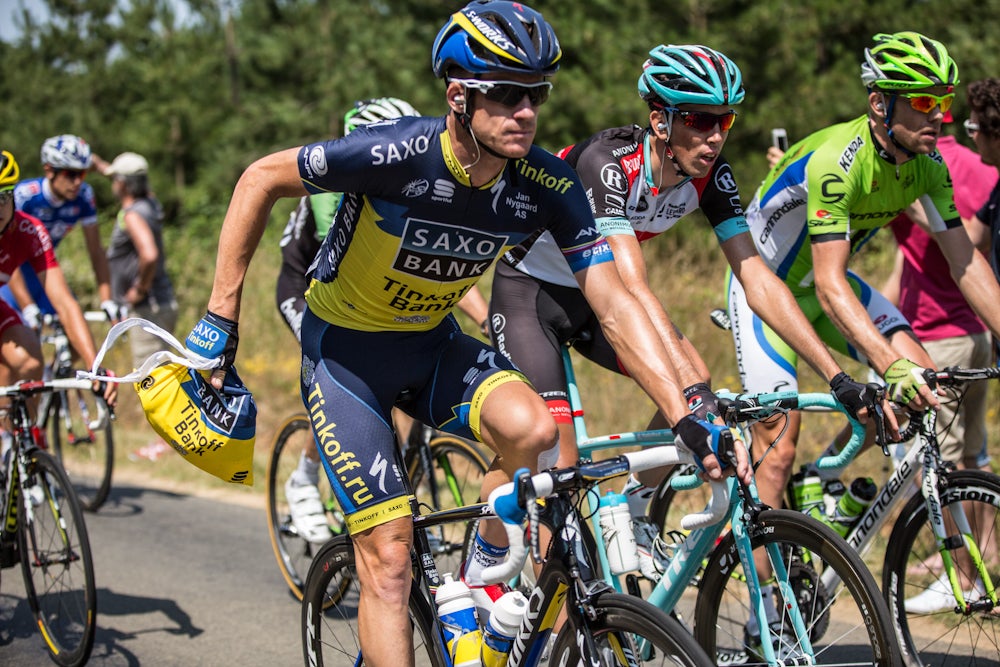Rogers tests positive for clenbuterol at Japan Cup

Michael Rogers tested positive for clenbuterol at the Japan Cup in October. Photo: BrakeThrough Media | VeloNews.com
Former time trial world champion Michael Rogers (Saxo-Tinkoff) tested positive for clenbuterol in a urine test at the Japan Cup in October. Cycling’s world governing body, the UCI, announced on Wednesday that the Australian was provisionally suspended.
Rogers won the Japan Cup ahead of Jack Bauer (Garmin-Sharp) and Damiano Cunego (Lampre-Merida).
According to Saxo management, Rogers has denied intentional ingestion and has expressed concern over tainted food.
“The decision to provisionally suspend this rider was made in response to a report from the WADA-accredited laboratory in Tokyo indicating an adverse analytical finding of clenbuterol in a urine sample collected from him in a test during the Japan Cup Cycle Road Race on 20 October 2013,” the UCI said in a statement. “The provisional suspension of Mr. Michael Rogers remains in force until a hearing panel convened by his national federation determines whether he has committed an anti-doping rule violation under Article 21 of the UCI Anti-Doping Rules.”
Rogers maintains the right to request testing of his B Sample.
Clenbuterol is a synthetic bronchodilator often prescribed to asthma sufferers. It is also regarded as a stimulant and has recently been used in off-label prescriptions as a weight-loss drug akin to ephedrine. The drug is on the World Anti-Doping Agency’s banned substances list and is specifically banned under Article 21 of the UCI’s anti-doping rules.
Clenbuterol has been used by meat producers as a non-steroidal means of increasing muscle-to-fat ratios, although the method is banned in most countries. There have been several documented cases of food-borne clenbuterol contamination, including in the United States and Europe, although the most notable occurred in China. In the U.S., the only permitted veterinary use of the drug is to address respiratory ailments in horses.
While banned, there has been little history of enforcement and meat producers have been known to use the drug to enhance the production of lean meats. China’s Ministry of Agriculture banned the use of clenbuterol in livestock following a 2011 scandal involving one of the country’s largest meat processing companies.
Rogers’ current teammate Alberto Contador lost his victories at the 2010 Tour de France and 2011 Giro d’Italia over a positive clenbuterol test at the former. Contador contested his innocence, blaming contaminated beef for the trace amounts of the drug found in his blood during the 2010 Tour, but the Court of Arbitration for Sport ruled that he must serve a ban and forfeit results.
According to Saxo management, Rogers “explained to the team management that he never ingested the substance knowingly nor deliberately and fears that the adverse analytical finding origins from a contaminated food source. Michael Rogers participated in Tour of Beijing the week before the Japan Cup and traveled directly from China to Japan.”
A three-time world champion, Rogers left Sky in late 2012 after helping Bradley Wiggins to the Tour de France title in July. The team announced a zero-tolerance policy for riders and staff who had been involved in doping previously, but denied that Rogers’ departure was tied to the policy. Rogers has admitted working with banned doping doctor Michele Ferrari in 2005 and 2006, but has denied using performance-enhancing drugs.
Rogers was ranked in Level 7 of 10 in a UCI doping suspicions list published by French daily L’Equipe in 2011, but no known prosecutions developed from that document.